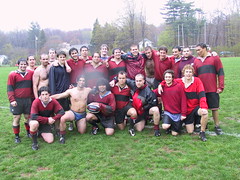Another long hiatus with this blogging thing, even though I am on leave and back in Baltimore. I've got to get my act together.
Instead of blogging, I've been spending my time reading for a paper on William Beckford and another, further down the road, on something I am calling to myself the "the 18thc literary institution' and which involves reading through John Nichols 14 vol Literary Anecdotesand trying to figure out relations between the various authors and figures mentioned there. (Basically the Nichols work is a record of books that the Bowyer firm of printers printed from the end of the 17thc to the end of the 18thc.)
And then I have gotten into Library Thing, with the idea of having a list of my books available for insurance purposes (except that, as it turns out, it looks as if it will be too expensive to insure them properly). Listing your books on this site takes a long time, and is, for someone like me, addictive.
Just today too, I signed up for Fox Soccer with Comcast which means that watching the English Premier League will be taking up a fair bit of time. (Caught a great game between Tottenham and Arsenal this morning.)
I also think the whole Australian cultural studies fracas that happened just as I was leaving Canberra didnt endear me to the blogging world. (The short version: I stupidly (and no doubt reductively) criticised australian cultural studies for being too tied to the cultural industries approach and marginalising critique and theory, which sparked off really personal attacks on me, basically I think out of some weird kind of envy, a let's-fuck-over-the tall-poppy-thing). And when I got back here from Australia and New Zealand I was really busy writing an application for a Fed Fellowship. My chances for that aren't good I suspect.
Tomorrow I go for a couple of days to New Haven: to read some comments that William Beckford made in his copy of Cowper's Memoirs which is held at the Beinecke, and, more to the point, to see Nick at Wesleyan who's just got his driving licence.
Been buying tons of books. Most recently: Derlugian's Bourdieu's Secret Admirer in the Causcasus and an old book on English scholars circa 1700 for my 18thc lit institution thing.
Transfiguring the immanent domain
3 weeks ago



